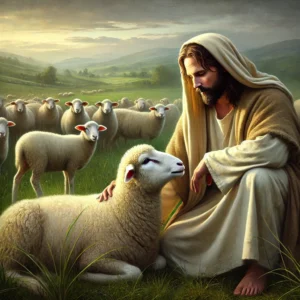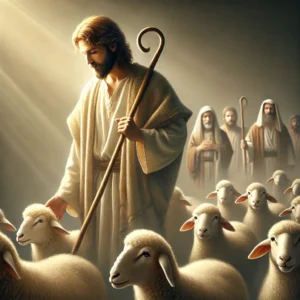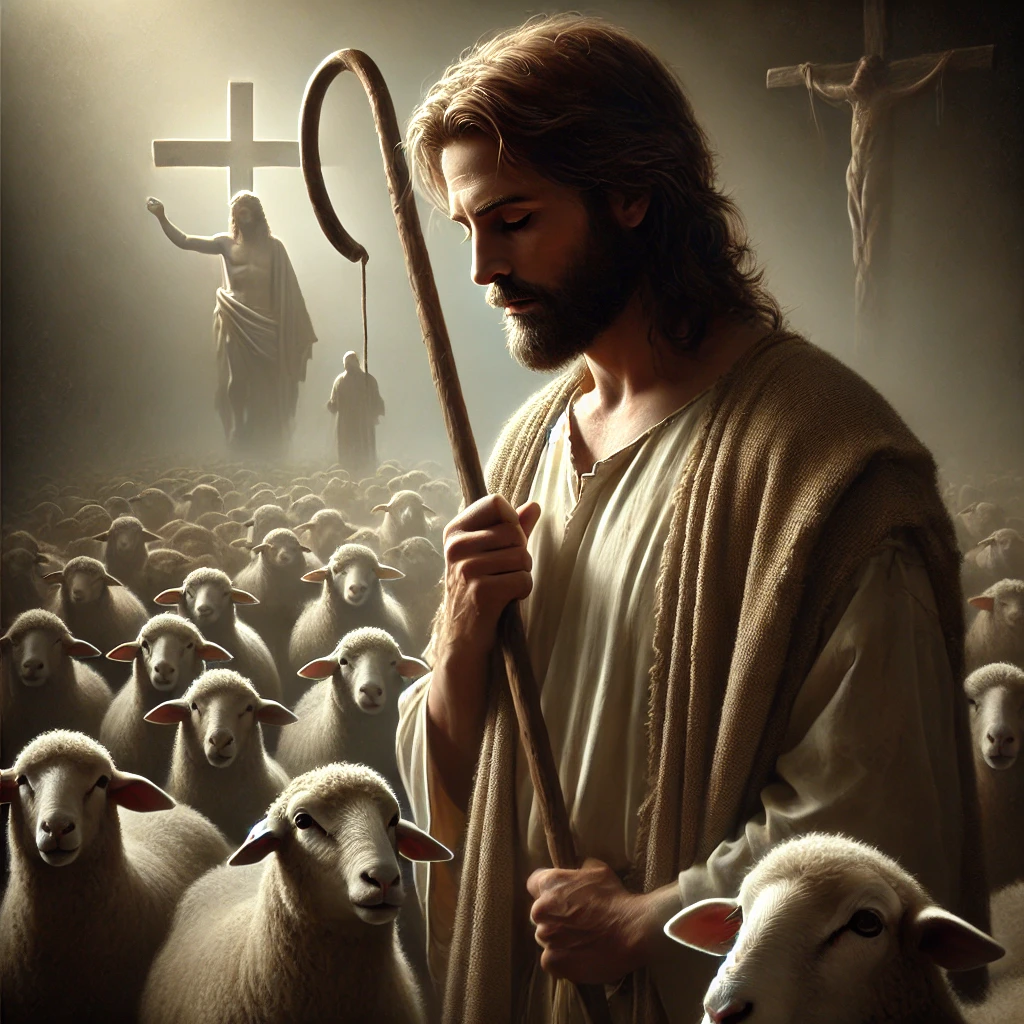
The image of Jesus as the Good Shepherd is one of the most comforting and profound symbols in the Bible, reflecting his leadership, protection, and deep care for humanity. This metaphor, introduced by Jesus himself in John 10:11, highlights his role as a loving and self-sacrificing leader who guides, nurtures, and protects his followers—his flock. Let’s explore the symbolism of Jesus as the Good Shepherd and what it reveals about his leadership, care, and relationship with humanity.
The Good Shepherd: A Symbol of Leadership

In John 10:11, Jesus declares, “I am the good shepherd. The good shepherd lays down his life for the sheep.” In biblical times, shepherds were responsible for leading, feeding, and protecting their sheep. The sheep depended entirely on the shepherd for survival, and in turn, the shepherd was committed to the well-being of the flock. Jesus uses this imagery to describe his role as a leader who guides and protects his people with love and dedication.
Unlike a hired hand, who may abandon the flock in the face of danger, the Good Shepherd stays with his sheep, even to the point of sacrificing his life for them. This reflects the selfless leadership of Jesus, who prioritizes the safety and well-being of his followers above his own life. His willingness to die on the cross for humanity’s sins is the ultimate act of this shepherd-like care, symbolizing his role as both protector and savior.
Protection and Sacrifice: Laying Down His Life

Jesus’ statement, “The good shepherd lays down his life for the sheep,” underscores his role as the protector of his people. In the ancient Near East, shepherds would risk their lives to defend their flock from predators or thieves. In the same way, Jesus’ sacrificial death on the cross is an act of protection and redemption for humanity. He willingly gave his life to rescue people from sin and spiritual death.
This act of sacrifice reveals Jesus’ deep commitment to humanity, showing that he is not a distant or indifferent leader, but one who is willing to suffer and die to bring salvation to his flock. His care goes beyond mere guidance—he takes on the ultimate responsibility of laying down his life for those he loves, fulfilling his mission to redeem the world.
Guiding the Flock: Leading by Example

Shepherds not only protect their sheep but also lead them to green pastures and still waters, ensuring that they are well-fed and safe. Similarly, Jesus leads his followers, not just by giving commands but by living as an example of righteousness, love, and compassion. In John 10:4, Jesus says, “When he has brought out all his own, he goes on ahead of them, and his sheep follow him because they know his voice.”
This speaks to the trust that the flock (humanity) has in their shepherd (Jesus). The sheep recognize the voice of their shepherd and follow him willingly, knowing that he will guide them to what is good and safe. For believers, this highlights the importance of listening to Jesus’ teachings and following his example in daily life. His guidance is always rooted in love, truth, and concern for our well-being.
The Shepherd Who Knows His Sheep

Another key aspect of Jesus as the Good Shepherd is his personal relationship with his flock. In John 10:14, Jesus says, “I am the good shepherd; I know my sheep and my sheep know me.” This verse reveals the deep connection and intimacy between Jesus and his followers. Unlike a distant ruler, Jesus knows each of his followers by name, understanding their individual needs, struggles, and hopes.
This personal care emphasizes the value of every person in the eyes of Jesus. He doesn’t see humanity as a faceless crowd but recognizes each individual’s worth. For Christians, this is a reminder that God’s love is personal and relational. Jesus cares about each person’s spiritual journey, offering guidance, forgiveness, and comfort tailored to each individual’s life.
Rescuing the Lost Sheep: A Message of Redemption

In the Parable of the Lost Sheep (Luke 15:3-7), Jesus illustrates the Good Shepherd’s willingness to leave the 99 sheep to find the one that is lost. This story reinforces Jesus’ mission to seek and save the lost, showing that no one is beyond redemption. The shepherd’s pursuit of the lost sheep symbolizes God’s relentless love for sinners, emphasizing that every person is precious in his sight.
Jesus, as the Good Shepherd, is not content to let anyone remain spiritually lost. His pursuit of the one lost sheep demonstrates the value of individual redemption and the inclusive nature of his love. This reveals that Jesus’ leadership is marked by compassion, mercy, and a determination to bring people back into the fold, no matter how far they’ve strayed.
Unity in the Flock: One Shepherd, One Flock

In John 10:16, Jesus says, “I have other sheep that are not of this sheep pen. I must bring them also. They too will listen to my voice, and there shall be one flock and one shepherd.” This statement speaks to the universal nature of Jesus’ mission. His care is not limited to a specific group but extends to all people, uniting them under his leadership.
The idea of “one flock” represents the unity Jesus desires for humanity. He breaks down barriers of race, culture, and status, inviting all people to become part of his flock. In today’s world, this message challenges divisions and calls for inclusivity, showing that Jesus’ leadership is about building a community where everyone is cared for and valued under one Shepherd.
The Good Shepherd as a Model for Leadership

Jesus’ role as the Good Shepherd provides a powerful model for leadership, both in spiritual and worldly contexts. His leadership is marked by service, sacrifice, and personal care, in contrast to the self-serving leadership often seen in the world. The Good Shepherd leads with humility and puts the needs of others first, showing that true leadership is about caring for the well-being of those we lead.
For Christians, this model is an invitation to adopt a leadership style that reflects Jesus’ example—one that is compassionate, selfless, and focused on uplifting others. Whether in spiritual communities, workplaces, or families, Jesus’ role as the Good Shepherd encourages leaders to prioritize love, service, and the needs of those under their care.
Conclusion
The image of Jesus as the Good Shepherd is a powerful symbol of his care, leadership, and love for humanity. His willingness to lay down his life, his deep personal connection with his followers, and his dedication to seeking the lost reveal the heart of a leader who is both compassionate and sacrificial. For Christians, Jesus’ example as the Good Shepherd offers profound lessons on how to lead with love, care for others, and trust in God’s guidance. His leadership brings comfort, protection, and unity, assuring believers that they are never alone and always under the loving watch of their Shepherd.



